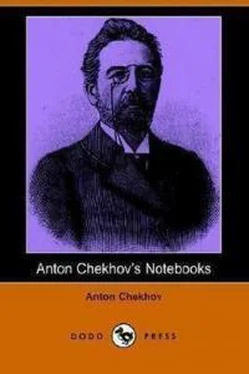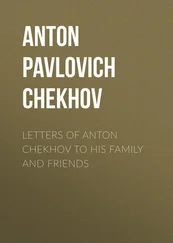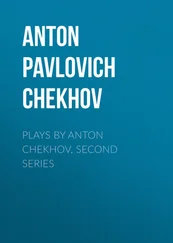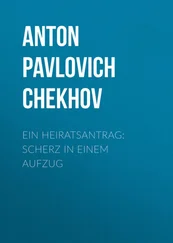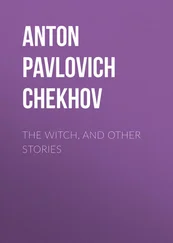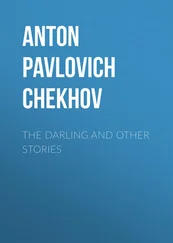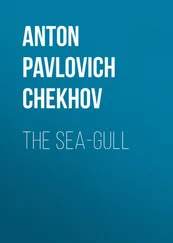Антон Чехов - Notebooks of Anton Chekhov
Здесь есть возможность читать онлайн «Антон Чехов - Notebooks of Anton Chekhov» весь текст электронной книги совершенно бесплатно (целиком полную версию без сокращений). В некоторых случаях можно слушать аудио, скачать через торрент в формате fb2 и присутствует краткое содержание. Год выпуска: 2014, Издательство: epubBooks Classics, Жанр: Биографии и Мемуары, на английском языке. Описание произведения, (предисловие) а так же отзывы посетителей доступны на портале библиотеки ЛибКат.
- Название:Notebooks of Anton Chekhov
- Автор:
- Издательство:epubBooks Classics
- Жанр:
- Год:2014
- ISBN:нет данных
- Рейтинг книги:4 / 5. Голосов: 1
-
Избранное:Добавить в избранное
- Отзывы:
-
Ваша оценка:
- 80
- 1
- 2
- 3
- 4
- 5
Notebooks of Anton Chekhov: краткое содержание, описание и аннотация
Предлагаем к чтению аннотацию, описание, краткое содержание или предисловие (зависит от того, что написал сам автор книги «Notebooks of Anton Chekhov»). Если вы не нашли необходимую информацию о книге — напишите в комментариях, мы постараемся отыскать её.
Notebooks of Anton Chekhov — читать онлайн бесплатно полную книгу (весь текст) целиком
Ниже представлен текст книги, разбитый по страницам. Система сохранения места последней прочитанной страницы, позволяет с удобством читать онлайн бесплатно книгу «Notebooks of Anton Chekhov», без необходимости каждый раз заново искать на чём Вы остановились. Поставьте закладку, и сможете в любой момент перейти на страницу, на которой закончили чтение.
Интервал:
Закладка:
The ease with which Jews change their religion is justified by many on the ground of indifference. But this is not a justification. One has to respect even one's indifference, and not change it for anything, since indifference in a decent man is also a religion.
February 13. Dinner at Mme. Morosov's. Tchouprov, Sololevsky, Blaramberg, Sablin and myself were present.
February 15. Pancakes at Soldatienkov's [a Moscow publisher]. Only Golziev [editor of Russian Thought ] and myself were present. Many fine pictures, nearly all badly hung. After the pancakes we drove to Levitan, from whom Soldatienkov bought a picture and two studies for 1,100 roubles. Met Polyenov [famous painter]. In the evening I was at professor Ostroumov's; he says that Levitan "can't help dying." O. himself is ill and obviously frightened.
February 16. Several of us met in the evening in the offices of Russian Thought to discuss the People's Theatre. Every one liked Shekhtel's plan.
February 19. Dinner at the "Continental" to commemorate the great reform [the abolition of the serfdom in 1861]. Tedious and incongruous. To dine, drink champagne, make a racket, and deliver speeches about national consciousness, the conscience of the people, freedom, and such things, while slaves in tail–coats are running round your tables, veritable serfs, and your coachmen wait outside in the street, in the bitter cold—that is lying to the Holy Ghost.
February 22. I went to Serpukhovo to an amateur performance in aid of the school at Novossiolki. As far as Zarizin I was accompanied by … a little queen in exile,—an actress who imagines herself great; uneducated and a bit vulgar.
From March 25 till April 10 I was laid up in Ostroumov's clinic. Hæmorrhage. Creaking, moisture in the apices of both my lungs; congestion in the apex of the right. On March 28 L.N. Tolstoi came to see me. We spoke of immortality. I told him the gist of Nossilov's story "The Theatre of the Voguls," and he evidently listened with great pleasure.
May 1. N. arrived. He is always thanking you for tea and dinner, apologizing, afraid of being late for the train; he talks a great deal, keeps mentioning his wife, like Gogol's Mijniev, pushes the proofs of his play over to you, first one sheet then another, giggles, attacks Menshikov, whom Tolstoi has "swallowed"; assures you that he would shoot Stassiulevitch, if the latter were to show himself at a review, as President of the Russian Republic; giggles again, wets his mustaches with the soup, eats hardly anything, and yet is quite a nice man after all.
May 4. The monks from the monastery paid us a visit. Dasha Moussin–Poushkin, the wife of the engineer Gliebov, who has been killed hunting, was there. She sang a great deal.
May 24. I was present at the examination of two schools in Tchirkov. [The Tchirkov and Mikhailovo schools.]
July 13. Opening of the school at Novossiolki which I have had built. The peasants gave me an icon with an inscription. The Zemstvo people were absent.
Braz [painter] does my portrait (for the Tretiakov Gallery). Two sittings a day.
July 22. I received a medal for my work on the census.
July 23. In Petersburg. Stopped at Souvorin's, in the drawing–room. Met VI. T…. who complained of his hysteria and praised his own books. I saw P. Gnyeditch and E. Karpov, who imitated Leykin showing off as a Spanish grandee.
July 27. At Leykin's at Ivanovsk. 28th in Moscow. In the editorial offices of Russian Thought , bugs in the sofa.
September 4. Arrived in Paris. "Moulin Rouge," danse du ventre, Café du Néon with Coffins, Café du Ciel, etc.
September 8. In Biarritz. V.M. Sobolevsky and Mme. V.A. Morosov are here. Every Russian in Biarritz complains of the number of Russians here.
September 14. Bayonne. Grande course landoise. Bull–fight.
September 22. From Biarritz to Nice via Toulouse.
September 23. Nice. I settled into the Pension Russe. Met Maxim Kovalevsky; lunched at his house at Beaulieu, with N.I. Yurassov and Yakobi, the artist. In Monte Carlo.
October 7. Confession of a spy.
October 9. I saw B.'s mother playing roulette. Unpleasant sight.
November 15. Monte Carlo. I saw how the croupier stole a louis d'or.
1898.
April 16. In Paris. Acquaintance with M.M. Antokolsky [sculptor] and negotiations for a statue of Peter the Great.
May 5. Returned home.
May 26. Sobolevsky came to Melikhovo. Must put down the fact that, in Paris, in spite of the rain and cold, I spent two or three weeks without being bored. Arrived here with M. Kovalevsky. Many interesting acquaintances: Paul Boyer, Art Roë, Bonnie, M. Dreyfus, De Roberti, Waliczewsky, Onieguin. Luncheons and dinners, at I.I. Schoukin's house. Left by Nord–express for Petersburg, whence to Moscow. At home, found wonderful weather.
An example of clerical boorishness. At a dinner party the critic Protopopov came up to M. Kovalevsky, clinked glasses and said: "I drink to science, so long as it does no harm to the people."
1901.
September 12. I was at L. Tolstoi's.
December 7. Talked to L. Tolstoi over the telephone.
1903.
January 8. "Istorichesky Vestnik," November 1902, "The Artistic Life of Moscow in the Seventies," by I.N. Zakharin. It is said in that article that I sent in my "Three Sisters" to the Theatrical and Literary Committee. It is not true.
Anton Chekhov's Note-books
(1892-1904)
Mankind has conceived history as a series of battles; hitherto it has considered fighting as the main thing in life.
* * * * *
Solomon made a great mistake when he asked for wisdom. [1] Among Chekhov's papers the following monologue was found, written in his own hand: Solomon (alone): Oh! how dark is life! No night, when I was a child, so terrified me by its darkness as does my invisible existence. Lord, to David my father thou gavest only the gift of harmonizing words and sounds, to sing and praise thee on strings, to lament sweetly, to make people weep or admire beauty; but why hast thou given me a meditative, sleepless, hungry mind? Like an insect born of the dust, I hide in darkness; and in fear and despair, all shaking and shivering, I see and hear in everything an invisible mystery. Why this morning? Why does the sun come out from behind the temple and gild the palm tree? Why this beauty of women? Where does the bird hurry, what is the meaning of its flight, if it and its young and the place to which it hastens will, like myself, turn to dust? It were better I had never been born or were a stone, to which God has given neither eyes nor thoughts. In order to tire out my body by nightfall, all day yesterday, like a mere workman I carried marble to the temple; but now the night has come and I cannot sleep … I'll go and lie down. Phorses told me that if one imagines a flock of sheep running and fixes one's attention upon it, the mind gets confused and one falls asleep, I'll do it … (exit).
* * * * *
Ordinary hypocrites pretend to be doves; political and literary hypocrites pretend to be eagles. But don't be disconcerted by their aquiline appearance. They are not eagles, but rats or dogs.
* * * * *
Those who are more stupid and more dirty than we are called the people. The administration classifies the population into taxpayers and non–taxpayers. But neither classification will do; we are all the people and all the best we are doing is the people's work.
* * * * *
If the Prince of Monaco has a roulette table, surely convicts may play at cards.
* * * * *
Iv. (Chekhov's brother Ivan) could philosophize about love, but he could not love.
* * * * *
Aliosha : "My mind, mother, is weakened by illness and I am now like a child: now I pray to God, now I cry, now I am happy."
Читать дальшеИнтервал:
Закладка:
Похожие книги на «Notebooks of Anton Chekhov»
Представляем Вашему вниманию похожие книги на «Notebooks of Anton Chekhov» списком для выбора. Мы отобрали схожую по названию и смыслу литературу в надежде предоставить читателям больше вариантов отыскать новые, интересные, ещё непрочитанные произведения.
Обсуждение, отзывы о книге «Notebooks of Anton Chekhov» и просто собственные мнения читателей. Оставьте ваши комментарии, напишите, что Вы думаете о произведении, его смысле или главных героях. Укажите что конкретно понравилось, а что нет, и почему Вы так считаете.
